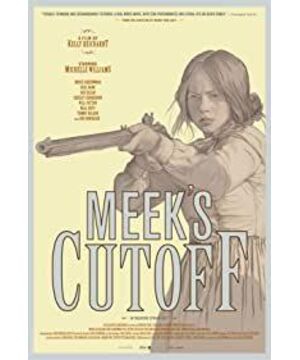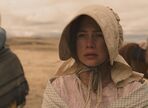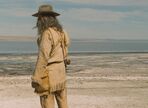The director's style has always been to take away everything that can be taken away. As a female director, it's nice to be so neat. In her films, she always insists that the audience does not need to let the audience know the background of the characters, the motives of their actions, or even the results. . . Her films have never been lengthy and start from scratch, because of this kind of lay-out. The audience and the people in the play immediately meet, the audience enters the protagonist's situation, and shares the same hesitation, hesitation, confusion, anxiety, and anxiety with the protagonist.
"Mick's Shortcut" is still a film that many Chinese audiences call "no story". The film is just a journey with the characters in the play. Several helpless families, holding hope and fear, got lost on the way to the west. They had two unreliable guides in succession, a white guide who bragged about leading them astray. One is speechless, and Mick is wishful thinking as an Indian native guide who can help them find their way. After experiencing the excitement of going on the road, the distress of getting lost, and the fear of finding the way, the film ends in the unknown.
Americans are the best at making themed films, and American films plant the American Dream in the hearts of audiences all over the world. But since the beginning of the new century, Americans have begun to seriously question their own history and have begun to try to subvert their own existence. The older generation of westerns represented by John Ford is undoubtedly telling the western colonial history of white Americans from a greatly deviated perspective. This traditional family and country sentiment has not kept up with the times. "Mick's Shortcut" cannot be said to be the only one, but it is certainly a rare story telling the history of the American West. Between the two levels of eulogizing and trampling on the history of the country, the director chooses a more prudent, complex and calm perspective. In the desert, one culture meets another, the ownership of the land, the confrontation between the two parties, the possibility of life and death, the exchange of interests, coercion and compromise, trust and betrayal, everything is in a silent confrontation. The story can turn in either direction, no one can predict it, no one can control it. It is at this moment of confrontation that great tension arises, and the sense of historical grandeur and the importance of individual life complement each other. Individuals are made grand by history. History becomes nuanced by individuals. No one is more important and powerful than anyone else. Neither side's narrative can usurp the other's existence.
The film chose a narrower frame ratio, which is also different from the wide screen used by Ford. The director excluded the grandeur and epic sense of the west under the wide screen, and intended to focus the audience's eyes on the here and now. Don't be inspired by the endless and magnificent mountains and deserts to inspire abstract and grand emotions. What the director wants to express is only the small and concrete moments that the protagonist has to face.
The cost of the film is two million US dollars. Low-cost independent films have always faced multiple difficulties in the century-old film history, but in fact, low-cost literary films have no inherent moral superiority over high-cost commercial films. Either way, the only thing that matters is the creative freedom of independent films that the director himself clearly enjoys, so outsiders don’t need to stress its low-cost dilemma. The happiness that comes with creative freedom can roughly balance out the hassle of a stretched budget. The premise of the success of a low-budget film is the intellectual level and diligence of the director. The "author's film" proposed by the French is very appropriate in this type of film. Kelly Leichhardt is one of the most authoritative female directors in contemporary America.
View more about Meek's Cutoff reviews











